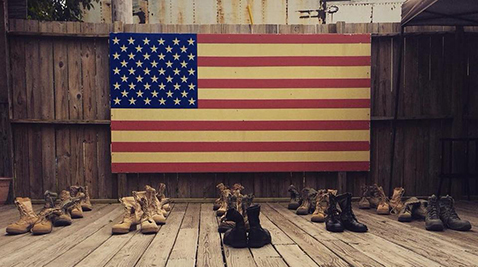WASHINGTON — When his first marriage fell apart in 2011, veteran Danny Farrar, struggling with the transition from war to civilian life, tried to commit suicide.
Five years later, after overcoming depression and post-traumatic stress disorder, the Frederick resident wanted to let veterans who have thought about suicide know that they aren’t alone.
“I always said, ‘Don’t say what you stand for, stand for it,’” Farrar said.

Farrar started a non-profit organization called 22 Needs a Face, referring to the estimated 22 veterans who commit suicide each day. He refined the name to something he thought resonated better with veterans: Platoon 22.
Farrar served in the Army for nine years as a paratrooper and has dealt with various traumatic issues. Although Farrar didn’t go through with his suicide attempt, his brother lost his life to suicide in 1998. The loss of his brother was one of the reasons for starting Platoon 22, Farrar said.
Another was two veterans from Frederick who committed suicide around the same time actor Robin Williams did on Aug. 11, 2014.
People felt like they lost their uncle when Robin Williams died because he was a familiar face to everyone, Farrar said.
As a result, Williams received so much publicity about his death, but no one seemed to pay that kind of attention to the veterans who kill themselves every day, Farrar said.
Platoon 22 helps veterans at risk for suicide, said Niki Thrash, director for development and marketing at the Mental Health Association of Frederick County
“These (veterans) should be taken care of to the fullest,” said Dave Posin, vice president and co-founder of Platoon 22.
Platoon 22 has four main goals:
-To bring increased public awareness to those veterans that are at risk of suicide.
-To host events for veterans that provide a sense of community and camaraderie.
-To raise money to help support severely underfunded crises call centers for veterans.
-To advocate policy changes within the Department of Veterans Affairs to ensure a mental health professional sees veterans during their transitions into civilian life.
Although Platoon 22 is operated out of Frederick County, the group sets up temporary memorials, which consist of former military members’ boots, wherever it goes. The simple memorials are meant to symbolize the veterans who have lost their lives to suicide, Farrar said.
The organization has collected 75 to 100 boots from two generations of soldiers from every military branch – veterans from the Vietnam War and from the Iraq and Afghanistan wars.
“Many (veterans in crisis) don’t want to be vulnerable and reach out,” Posin said. “We want to create awareness and educate the public about the silent enemy.”
Platoon 22 also would like to change the negative stereotypes towards mental health, Farrar said.
“People won’t even call it suicide,” Farrar said. “They won’t talk about it. We need to change this stigma.”
Platoon 22 celebrated its one-year anniversary on Oct. 3. Since the creation of the organization, it has helped many veterans feel more connected to others in similar situations, Farrar said.
Veterans can look at the Platoon 22 events as another mission and help other service members that are struggling, Farrar said.
Between June and September, the organization made a total of $6,000 in contributions to the Mental Health Association of Frederick County, which provides advocacy, education and direct service programs to those who need it.
“There is a real synergy between our two organizations,” Thrash said.
“It’s a mutual awareness,” said Suzi Borg, program director of community support services at the association. “(Platoon 22) is making sure that people are aware that they can contact us.”
A note to veterans: Reach out, Posin said.
“Your brothers are there for you, your sisters are there for you, Platoon 22 and other great organizations are here for you,” Posin said.


You must be logged in to post a comment.